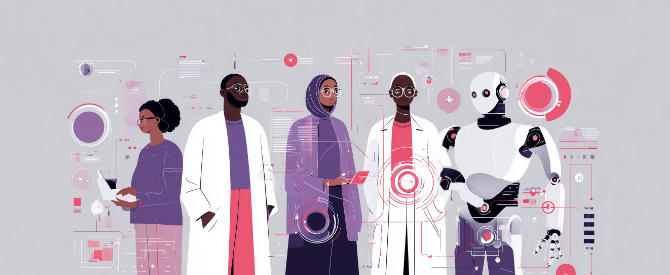
By Thabo Peyi
Mar 10th, 2025
5 min read
The Digital Divide in South Africa: What Is It and How Can We Bridge the Gap?

What is the digital divide
The “digital divide” is a term that highlights the discrepancies in access to digital communication tools. These tools can range from smartphones and laptops to the internet. These disparities can be observed across different demographic groups, including gender, financial class, and certain regions of the world.
South Africa has one of the highest levels of inequality in the world, which plays a significant role in the country’s digital divide. Schools in underdeveloped areas often lack access to ICT (information and communication technology) compared to those in better-funded areas. However, the complexities of the digital divide do not end there. Schools in more affluent areas not only have access to ICT but also benefit from better-quality telecommunications, such as high-speed internet connections, laptops, and digital content—everything needed to thrive in the digital age.
Related
Categories
All
Entertainment
Self Help
Tech News
Company Updates
Community
Social Media
Teachers in disadvantaged communities may also lack adequate digital knowledge, making it difficult to utilise the already limited, or in some cases non-existent, ICT resources. This discrepancy further widens the digital divide in South Africa.

Why does the digital divide exist
Understanding what the digital divide is, is key; however, understanding why it exists is also important. In South Africa, the digital divide exists for a variety of reasons. Low-income communities are unable to afford the high cost of connectivity, while living in rural and remote areas can mean the necessary infrastructure to provide internet access is lacking.
The inability to afford the cost of internet or quality laptops can lead to digital illiteracy, causing people to fall further behind those who do have access. Additionally, older individuals may find it difficult to integrate new technology, such as the internet and smart devices, into their daily lives. RSAWEB constantly strives, through working with our various partners, to provide high-quality internet at affordable prices, with the hope of connecting as many South Africans as possible and providing them with the access to bridge the digital divide.

The negative implications of the digital divide
If the digital divide is not addressed, there will be numerous consequences that impact not only the current generation but also future generations. The lack of affordable connectivity and data for low-income communities can affect children’s ability to learn the same curriculum as their peers in well-funded areas.
Job opportunities and certain roles may require candidates to have an understanding of various telecommunication tools, further deepening inequality in South Africa. Additionally, a lack of access to important social and political information, both in South Africa and globally, can leave individuals uninformed.
With RSAWEB’s affordable packages, we aim to minimise the impact of the digital divide and help enrich those in low-income communities, giving them the same opportunities as those in more affluent areas.
As businesses and healthcare increasingly rely on digital technology, and the education sector integrates ICTs into its operations, making online learning the future of education, those without access to quality ICT will be stranded and left behind as the world progresses.
These are just a few of the consequences that many South Africans currently face, and will continue to face, if the digital divide is not properly addressed by both businesses and the government.

Ways to fix the Digital Divide
- Create Infrastructure: Develop projects aimed at expanding digital infrastructure into all rural areas of South Africa to increase internet access in underdeveloped regions.
- Digital Literacy Training: Implement initiatives targeting low-income communities to teach them how to navigate the internet constructively. Additionally, upskill educators so they can teach digital literacy to their students and incorporate ICTs into their teaching programmes.
- Curriculum Reform: Develop a curriculum with a key focus on digital literacy and other skills aligned with modern trends.
- Increase Access to Digital Devices: Establish programmes that provide low-income communities with access to laptops and the internet. This can be achieved by installing internet in schools, setting up computer labs, and creating community computer hubs.
- Public and Private Sector Collaboration: Government and business cooperation is essential to delivering internet access, laptops, computers, and other resources needed to overcome the digital divide
RSAWEB's role in bridging the digital divide
RSAWEB has been a long-time investor in local communities, seeking to connect underdeveloped areas in and around Cape Town with the best fibre. From connecting over a 100 schools and NGOs to supporting local businesses in increasing ICT awareness and knowledge, RSAWEB understands the importance of making the internet accessible to all. By doing so, we further enrich the local community and build a foundation where young people can strive for greatness and empower others.
Read more about the amazing work we’ve done in the local community, by empowering the youth in the digital age, as well as how you can get involved.
Latest Blogs
In a world of endless scrolling and infinite choice, connection…
2026 is set to redefine technology with AI supercomputing, agentic…
The Digital Divide in South Africa: What Is It and How Can We Bridge the Gap?

Thabo Peyi
Mar 10th, 2025
5 min read

What is the digital divide
The “digital divide” is a term that highlights the discrepancies in access to digital communication tools. These tools can range from smartphones and laptops to the internet.
These disparities can be observed across different demographic groups, including gender, financial class, and certain regions of the world.
South Africa has one of the highest levels of inequality in the world, which plays a significant role in the country’s digital divide. Schools in underdeveloped areas often lack access to ICT (information and communication technology) compared to those in better-funded areas.
However, the complexities of the digital divide do not end there. Schools in more affluent areas not only have access to ICT but also benefit from better-quality telecommunications, such as high-speed internet connections, laptops, and digital content—everything needed to thrive in the digital age.
Teachers in disadvantaged communities may also lack adequate digital knowledge, making it difficult to utilise the already limited, or in some cases non-existent, ICT resources. This discrepancy further widens the digital divide in South Africa.

Why does the digital divide exist
Understanding what the digital divide is, is key; however, understanding why it exists is also important. In South Africa, the digital divide exists for a variety of reasons.
Low-income communities are unable to afford the high cost of connectivity, while living in rural and remote areas can mean the necessary infrastructure to provide internet access is lacking.
The inability to afford the cost of internet or quality laptops can lead to digital illiteracy, causing people to fall further behind those who do have access.
Additionally, older individuals may find it difficult to integrate new technology, such as the internet and smart devices, into their daily lives.
RSAWEB constantly strives, through working with our various partners, to provide high-quality internet at affordable prices, with the hope of connecting as many South Africans as possible and providing them with the access to bridge the digital divide.

The negative implications of the digital divide
If the digital divide is not addressed, there will be numerous consequences that impact not only the current generation but also future generations.
The lack of affordable connectivity and data for low-income communities can affect children’s ability to learn the same curriculum as their peers in well-funded areas.
Job opportunities and certain roles may require candidates to have an understanding of various telecommunication tools, further deepening inequality in South Africa.
Additionally, a lack of access to important social and political information, both in South Africa and globally, can leave individuals uninformed.
With RSAWEB’s affordable packages, we aim to minimise the impact of the digital divide and help enrich those in low-income communities, giving them the same opportunities as those in more affluent areas.
As businesses and healthcare increasingly rely on digital technology, and the education sector integrates ICTs into its operations, making online learning the future of education, those without access to quality ICT will be stranded and left behind as the world progresses.
These are just a few of the consequences that many South Africans currently face, and will continue to face, if the digital divide is not properly addressed by both businesses and the government.

Ways to fix the Digital Divide
- Create Infrastructure: Develop projects aimed at expanding digital infrastructure into all rural areas of South Africa to increase internet access in underdeveloped regions.
- Digital Literacy Training: Implement initiatives targeting low-income communities to teach them how to navigate the internet constructively. Additionally, upskill educators so they can teach digital literacy to their students and incorporate ICTs into their teaching programmes.
- Curriculum Reform: Develop a curriculum with a key focus on digital literacy and other skills aligned with modern trends.
- Increase Access to Digital Devices: Establish programmes that provide low-income communities with access to laptops and the internet. This can be achieved by installing internet in schools, setting up computer labs, and creating community computer hubs.
- Public and Private Sector Collaboration: Government and business cooperation is essential to delivering internet access, laptops, computers, and other resources needed to overcome the digital divide
RSAWEB's role in bridging the digital divide
RSAWEB has been a long-time investor in local communities, seeking to connect underdeveloped areas in and around Cape Town with the best fibre. From connecting over a 100 schools and NGOs to supporting local businesses in increasing ICT awareness and knowledge,
RSAWEB understands the importance of making the internet accessible to all. By doing so, we further enrich the local community and build a foundation where young people can strive for greatness and empower others.
Read more about the amazing work we’ve done in the local community, by empowering the youth in the digital age, as well as how you can get involved.











